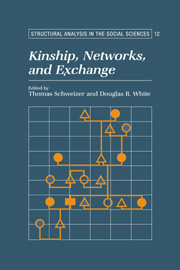Book contents
- Frontmatter
- Contents
- Preface
- List of contributors
- 1 Revitalizing the Study of Kinship and Exchange with Network Approaches
- I Representing Kinship Dynamics, Material Flow, and Economic Cooperation
- II Individual Embeddedness and the Larger Structure of Kinship and Exchange Networks
- 6 Experiential Flexibility of Cultural Models: Kinship Knowledge and Networks among Individual Khasi (Meghalaya, N.E. India)
- 7 Moral Economy and Self-interest: Kinship, Friendship, and Exchange among the Pokot (N.W. Kenya)
- 8 Risk, Uncertainty, and Economic Exchange in a Pastoral Community of the Andean Highlands (Huancar, N.W. Argentina)
- III Marriage, Exchange, and Alliance: Reconsidering Bridewealth and Dowry
- IV Emergence, Development, and Transformation of Kin-Based Exchange Systems
- Index
7 - Moral Economy and Self-interest: Kinship, Friendship, and Exchange among the Pokot (N.W. Kenya)
Published online by Cambridge University Press: 05 November 2011
- Frontmatter
- Contents
- Preface
- List of contributors
- 1 Revitalizing the Study of Kinship and Exchange with Network Approaches
- I Representing Kinship Dynamics, Material Flow, and Economic Cooperation
- II Individual Embeddedness and the Larger Structure of Kinship and Exchange Networks
- 6 Experiential Flexibility of Cultural Models: Kinship Knowledge and Networks among Individual Khasi (Meghalaya, N.E. India)
- 7 Moral Economy and Self-interest: Kinship, Friendship, and Exchange among the Pokot (N.W. Kenya)
- 8 Risk, Uncertainty, and Economic Exchange in a Pastoral Community of the Andean Highlands (Huancar, N.W. Argentina)
- III Marriage, Exchange, and Alliance: Reconsidering Bridewealth and Dowry
- IV Emergence, Development, and Transformation of Kin-Based Exchange Systems
- Index
Summary
The moral economy of peasants has been a controversial concept in economic anthropology for several decades now (Hyden 1985; Scott 1976; for a critical review of relevant literature, see Lemarchand 1989). It has been defined by Scott as an economy “in which a subsistence ethos guarantees at least minimal provisioning to all households” (Scott 1976, in Ensminger 1992: 2). However, the operationalization of “moral economy” (or an “economy of affection” as it has been alternatively called) has proved notoriously difficult. In many accounts moral economy has been opposed to self-interested, accumulating behavior. Lemarchand (1989) has asked how an economy of affection can be demarcated from a market-oriented economy. Talk of moral economy has frequently been colored in terms of values and affection. Kinship and friendship are pointed to as the guidelines of economic behavior. In the same vein, Scott talks of a “subsistence ethos” rather than of production and exchange as such. Hence, it has been overly difficult, when talking about moral economy, to correlate individual interests and social institutions. Why are successful actors interested in a continuation of a moral economy? Why are paupers retained in exchange circuits for such a long time, even though they bring no discernible benefits to the group? It is the aim of this paper to explore qualitative and quantitative aspects of distribution within a moral economy.
- Type
- Chapter
- Information
- Kinship, Networks, and Exchange , pp. 137 - 157Publisher: Cambridge University PressPrint publication year: 1998
- 25
- Cited by

